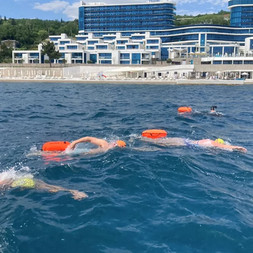Building your race nutrition plan - Part 1: Carbohydrates
- Christie Robson

- Jul 28, 2023
- 4 min read
To build your race plan, there's a few things we need to work through:
Carbohydrates
Hydration: fluid requirements and what you will have
Sodium
First up, we're looking at carbohydrates.
HOW MUCH
For carbohydrates, it's best to work off an hourly goal amount. Sports nutrition guidelines tell us that for endurance sport over 3 hours, aiming for 60 to 90g of carbohydrates per hour is useful for maintaining energy, preventing cramps and optimising performance.
You may have heard before about aiming for 1g of carbohydrate per kilogram of body weight, or to aim for a certain amount of calories per hour... however, these previous strategies aren't as effective as the 60-90g/hr guideline.
Why?
Well, research over the last years has found that all adults have the ability to absorb (or oxidise) up to 60g of glucose per hour, regardless of gender, size or age. So, really, we should all be able to take on at least 60g per hour! But, the amount you need will depend on your sport, the conditions, any health conditions, what you tolerate and how long your event is! if you're aiming for more than 60g of carbohydrate per hour, you want the extra to come from fructose based products.
Fructose is absorbed differently to glucose in the body, and therefore we're able to absorb both and get to a higher rate per hour. Whereas, if you were to take on 90g of pure glucose, your body wouldn't be able to absorb all of this eventually, and it would just sit in your gut, causing bloating and that 'hitting the wall' or bonking feeling.
Working out your rate
So, how do we know what amount to aim for. My guidelines I use with athletes include some considerations like:
Are you less than 70kg? Are you a slower female? Are you post menopausal? = 50-60g / hour
More than 70kg? Fast female at top of age groups? Suffer from bad cramps often? = 70-80g/hour
More than 90kg? Fast male athlete? Taller, fast female, well trained? Fast and suffer from cramps? = 90g/hour
There are always exceptions to the rules, and I've had athletes get in 130g/hr on the bike (for both 70.3 AND Ironman triathlons) and 100g/hr on the run.
Whereas in marathon swimming, we usually aim for a little less - between 45-75g of carbs per hour... with some athletes on the lower end depending on health conditions or how they use fuel; and some (like Andy Donaldson), aiming at the higher end of 90g+ / hour.
If you're unsure where to start, go for 50-60g in key training sessions. Take notice of energy, hunger, cramps, and focus. If you feel like you could do with some more, step it up next time!
CARBOHYDRATE OPTIONS
There are a number of ways to get your carbs in in a race. What you do will come down to;
Logistics
Confidence on bike handling
Taste preferences
Gut tolerance
Time on bike
Pace
Budget
Hydration goals and how much you sweat
To work out what things you should take to get your carbs in, you'll need to think about your hydration too... which we'll explore soon!
If you are going to be drinking fluid regularly, then having carbohydrates in your drink is useful! Especially if you've got a high sweat rate. And it's a non-negotiable for marathon swimming!
Some athletes like to go fluids only for events like triathlons, ironman triathlon, and trail running. For events under 4-5 hours, you can get away with this. However, my experience working with many long course triathletes, endurance and adventure athletes, and racing myself, is that having some small 'solid' foods can be really useful for managing energy levels, feelings of hunger in the later stages, and preventing flavour fatigue.
WAYS TO GET YOUR CARBOHYDRATES IN
There are SO many options when it comes to sports nutrition and energy products. So to get started, keep it simple. Don't over complicate it, and go with things that you think, or you know, will sit better for you. Just because an athlete eats peanut butter sandwiches in an Ironman, or have rice pudding in a marathon swim, doesn't mean it will work for you... or that you'll like it!
Here's some options:
Sports drinks - ones with carbohydrates AND electrolytes...not electrolytes only.
Gels
Bars (like clif, maurten, high5, sponser)
Bloks, chews, lollies
Sandwiches - vegemite, peanut butter, jam
Bananas
Dried fruit like figs and dates
Pureed fruit or baby food pouches
Easy to eat muesli bars
Soft drink
Homemade Bike Brownies or Rice Porridge Bars
CHOOSING YOUR NUTRITION PRODUCTS
So, we know where to get carbohydrates in racing now, but how on earth do you chose what's best for you?! Let's dive a bit deeper into certain products and how they differ... because not all sports drinks are the same, and not all gels are the same! What a way to confuse us!!
Whatever you chose to use, it's important you practice this! Use all key training sessions (even if less than 90 minutes) to practice your race day nutrition. That includes amounts, logistics, and timings!
You will need to think about your hydration needs for the race too, as this will affect how much fluid you're drinking and therefore how much carbohydrate you include in that. For example, if you only need 500ml per hour, but 90g of carbohydrates, it's going to make it very difficult to drink a sports drink with 90g of carbohydrates in 500ml...some products do this, and sometimes you need to concentrate your drink (with two, three, or four times the recommended amount!), but not everyone enjoys or tolerates them!
Your budget can play a big role in your choices too... and how your gut tolerates things. Here's some other alternatives to gels if you don't like them. It's still important to take these with some water or fluid to help absorption in the gut.
Stay tuned for the next blog when we'll dive into hydration and how to match these two together!
You can also book a Performance Consultation to discuss a race nutrition strategy and I'll recommend the best products and, or, foods for you!
Happy training and eating,
Christie





























Comments